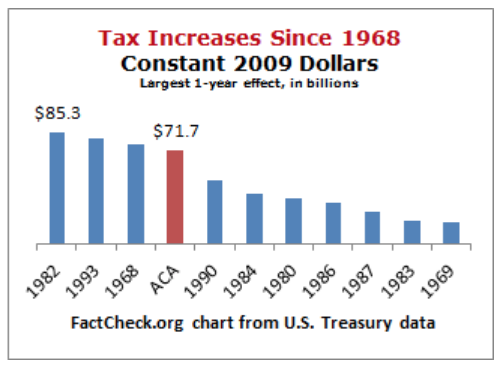Largest Tax Increase In US History?

Image Source: Pexels
The recently announced auto tariffs are expected to raise roughly $100 billion per year in revenue. How does that compare with other major tax increases?
According to the Tax Foundation, the previous record was $76.8 billion for the 2011 tax increase to finance the ACA (Obamacare).

In real terms, the auto tariffs are not as large as some of the previous tax increases, but it remains one of the largest tax increases since 1968. (The CPI is up about 50% since 2009.)

With more tariffs expected soon, the ultimate Trump administration tariff program may well end up being the largest tax increase, even in real terms. So what do the Democrats think of this policy, one of the most consequential changes in federal tax policy in my entire life?
I checked with the New York Times, and as usual they had very long article that contained lots of interviews. I was especially interested in learning what the Democrats thought of the policy. The article did present the views on a number of key political figures, but none of them were Democrats. Indeed, other than Trump, none of them were Republicans.
You may believe that the NYT has a liberal bias, but I’m quite certain that when Obama’s tax increase was proposed, the “newspaper of record” provided at least some coverage of Republican views of the legislation. Do the Democrats plan to repeal the auto tariff next time they take office? Do Republican congressmen have views on the issue? Isn’t that something that we should know?
It is certainly interesting to learn that Trump’s tariffs are opposed by the leaders of Canada, Mexico and France, but given that the tax is actually paid by Americans, I wish they’d told us what American politicians thought of the idea.
Here’s AI Overview:
The U.S. Constitution grants Congress the power to “lay and collect Taxes, Duties, Imposts and Excises” (Article I, Section 8), including tariffs, and to regulate commerce with foreign nations. However, the President also has authority to impose tariffs, particularly through delegated powers and under certain conditions, such as national security threats or unfair trade practices.
I’m having trouble understanding the legal basis for these tariffs. It’s hard to believe that Canada is a national security threat, and our free trade agreement with Canada was negotiated by President Trump in 2020. As recently as last fall he called it the best trade deal ever. So the “unfair trade practices” also doesn’t seem to apply.
In the past, the Supreme Court has often taken the view that governments can do pretty much whatever they wish. Thus although the “takings clause” says that eminent domain applies only to projects with a “public use”, the courts have ruled that a public purpose is almost anything the government says it is. Maybe that reasoning applies here as well.
I notice that the administration denies that the bombing raid on Yemen is a “war”, and yet insists that we can use “war powers” to deport Venezuelans. So war also seems to be one of those things that have a fairly loose definition–war is migration, not bombing.
The bottom line is that we should not expect the Constitution to be an effective limit on the powers of the US government.
PS. It is also expected that there will be a major tax cut enacted later this year, which will take the form of extending the earlier Trump tax cuts, which were otherwise set to expire.
More By This Author:
The New China ShockIs Fiscal Policy Effective?
Listen To Dallas



